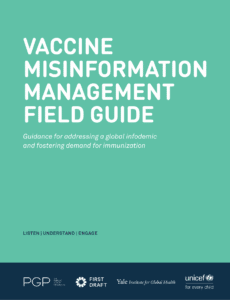Misinformation Alerts
Knowing what misinformation is being shared can help you generate effective messaging.
These insights are based on a combination of automated media monitoring and manual review by public health data analysts. Media data are publicly available data from many sources, such as social media, broadcast television, newspapers and magazines, news websites, online video, blogs, and more. Analysts from the Public Good Projects triangulate this data along with other data from fact checking organizations and investigative sources to provide an accurate, but not exhaustive, list of currently circulating misinformation.
Misinformation Alerts
Knowing what misinformation is being shared can help you generate effective messaging.
These insights are based on a combination of automated media monitoring and manual review by public health data analysts. Media data are publicly available data from many sources, such as social media, broadcast television, newspapers and magazines, news websites, online video, blogs, and more. Analysts from the Public Good Projects triangulate this data along with other data from fact checking organizations and investigative sources to provide an accurate, but not exhaustive, list of currently circulating misinformation.Alerts are categorized as high, medium, and low risk.
- High risk alerts: Narratives with widespread circulation across communities, high engagement, exponential velocity, and a high potential to impact health decisions. Are often more memorable than accurate information.
- Medium risk alerts: Narratives that are circulating in priority populations and pose some threat to health. Potential for further spread due to the tactics used or because of predicted velocity. Often highlights the questions and concerns of people.
- Low risk alerts: Narratives that are limited in reach, don’t impact your community, or lack the qualities necessary for future spread. May indicate information gaps, confusion, or concerns.
A trending blog post falsely claims that no COVID-19 vaccines have been approved by the FDA. This misinformation has been circulating online since the FDA approval of the Pfizer vaccine in August. Vaccine opponents have since suggested that Comirnaty, the brand name of the Pfizer vaccine, is different from the vaccine that is being administered in the U.S. The Pfizer vaccine, like most drugs, was not marketed under a brand name until it received a non-emergency standard FDA approval. Similarly, the Moderna COVID-19 vaccine is marketed under the brand name “Spikevax” in the E.U., where it is approved for ages 12 and up, but not in the U.S., where it is still under emergency use authorization.
Recommendation: Confusion regarding the Comirnaty name persists. Providing clear guidance and updating informational materials to state that the FDA-approved Comirnaty and the FDA-authorized Pfizer-BioNTech vaccine are the same is recommended. If the Moderna COVID-19 vaccine receives non-emergency standard FDA approval, as is expected, the transition to a brand name is expected to create similar confusion and conspiracies. Fact Checking Source(s): 
Several widely-shared social media posts have falsely claimed that vaccines are ineffective against COVID-19, particularly the Omicron variant. One post with more than 70,000 engagements claims that there is no difference in the severity of COVID-19 in vaccinated and unvaccinated patients. This claim is false. Scientific studies and first-hand reports from hospitals and health authorities worldwide have shown repeatedly that vaccinated people are far less likely than unvaccinated people to be hospitalized, enter intensive care, require ventilators, or die from COVID-19. Although Omicron is more able to evade vaccines than other COVID-19 variants, the vaccine still provides significant protection against severe illness and death, and boosters increase protection against infection.
Recommendation: The spread of Omicron has led to an increase in misinformation about the efficacy of vaccines against the variant and the public is understandably confused. Emphasizing that COVID-19 vaccines remain the best form of protection against the virus and that unvaccinated people are at a higher risk from the virus is recommended. Emphasizing that booster doses can increase protection against Omicron for those already vaccinated is also recommended. Fact-Checking Source(s): 
In a viral video, a scientist well-known for attempting to discredit COVID-19 vaccines falsely claims that mRNA vaccines cause permanent damage to vital organs in children. This myth has been debunked repeatedly by independent fact-checkers but persists among vaccine opponents.
Recommendation: Although myths around mRNA technology have been consistently refuted, their persistence shows that confusion remains. Continuing to explain how mRNA vaccines work and why they are safe is recommended. Ensuring that informational materials specifically call out that mRNA vaccines are safe for children is also recommended. Fact-Checking Source(s): 
An article published on a popular right-wing news site falsely claims that the NIH, under Dr. Anthony Fauci’s leadership, funded a clinical trial of a potential HIV treatment that resulted in the deaths of several HIV-positive foster children in New York between 1985 and 2005. A 2009 investigation of the clinical trial found that many of the children were extremely ill and had developed multiple AIDS-related complications prior to their enrollment in the trial. None of the deaths were a result of the treatment.
Recommendation: Responding to each piece of misinformation may detract from priority talking points. Fact Checking Source(s): 
A viral story misrepresents Dr. Fauci’s vaccine safety comments from a March 2020 interview to claim that the now approved and authorized COVID-19 vaccines are making the pandemic worse. In the 21-month-old interview, Dr. Fauci talked about how some previous vaccines have made individuals more likely to get infected. His remarks were in reference to vaccines that did not go through clinical trials and were not vaccines for COVID-19, but have been taken out of context and are now being used to spread skepticism around COVID-19 vaccine safety and effectiveness.
Recommendation: Myths continue to circulate that vaccines can make people more susceptible to COVID-19 infection. The vaccines have been, and continue to be, tested to make sure that they are safe and that they prevent or reduce the severity of illness. Continuing to debunk these conspiracy theories and emphasizing the safety of the vaccines is recommended. Fact Checking Source(s): 
A trending article falsely claims that Pfizer and Moderna COVID-19 vaccines dramatically increase heart risks, including that of heart attack. This claim is based on an abstract published in the journal Circulation in November. Since then, the publisher has issued an “expression of concern” to warn that the abstract lacks sufficient data and may be unreliable, but the abstract has already been widely used to spread misinformation and stoke fears about the vaccines. There is currently no credible evidence showing that mRNA vaccines increase the risk of heart attack in any population.
Recommendation: Myths connecting COVID-19 to AIDS are continuing to spread online. Updating materials to debunk claims about HIV and the COVID-19 vaccines is recommended, as is monitoring local conversations about so-called “VAIDS.” Fact Checking Source(s): 
On a popular podcast, a physician known for spreading COVID-19 and vaccine misinformation falsely claimed that vaccines are not safe or effective and promoted “natural immunity” and alternative treatments as superior. Clips from the show have racked up millions of views on social media. Vaccines are our best protection against COVID-19, dramatically reducing the risk of severe illness and death. “Natural immunity,” or immunity gained from infection, is less predictable than vaccine immunity and can only be gained by risking serious illness and exposing others to COVID-19.
Recommendation: There is widespread confusion over whether “natural” immunity is better or worse than vaccine-derived immunity. Reiterating that the only safe way to acquire immunity is through vaccination, that infection-derived immunity is unpredictable, and that alternative treatments have not been shown to work against COVID-19, is recommended. Helpful talking points can be found here. Fact-Checking Source(s): 
Some social media users are claiming that the rising number of COVID-19 cases, despite high vaccination rates in certain areas, is proof that vaccines and vaccine mandates don’t work. Others argue that unvaccinated people are being treated unfairly because the vaccinated can also contract COVID-19. But vaccinated people are at a lower risk of contracting the virus and spreading it compared to unvaccinated people. Even against Omicron, which appears to be able to partially evade current vaccines, vaccinated people are far less likely to get seriously ill or need hospitalization.
Recommendation: The spread of Omicron has led to an increase in misinformation about the efficacy of vaccines against the variant. Emphasizing that COVID-19 vaccines remain the best form of protection against the virus and that unvaccinated people are at a higher risk from the virus is recommended. Fact Checking Source(s): 
The NYC Department of Transportation announced that an unauthorized bus stop ad has been removed for spreading disinformation. The ad, which mimics the appearance of the New York Department of Health’s “10 Reasons to Get Vaccinated” poster, makes multiple false claims, including that COVID-19 vaccines are dangerous, cause pregnancy complications, and cause new variants. COVID-19 vaccines are safe, as evidenced by the fact that 80 percent of NYC residents, including more than half of all children ages 5 and up, have received at least one vaccine dose.
Recommendation: Responding to each piece of misinformation may detract from priority talking points. Fact Checking Source(s): 
Social media users are using a preprint, non-peer reviewed study to falsely claim that Pfizer and Moderna COVID-19 vaccines make people more vulnerable to infection with Omicron. Viral posts also claim that the public was lied to and that the vaccine does nothing to stop the spread of COVID-19. While it’s true that our current vaccines are less effective against Omicron, they still offer some protection, especially against serious illness and hospitalization. Studies have also shown that a third or “booster” dose offers significant protection against the new variant.
Recommendation: The spread of Omicron has led to an increase in misinformation about the efficacy of vaccines against the variant and the public is understandably confused. Emphasizing that COVID-19 vaccines remain the best form of protection against the virus and that unvaccinated people are at a higher risk from the virus is recommended. Emphasizing that booster doses can increase protection against Omicron for those already vaccinated is also recommended. Fact Checking Source(s): 
Alerts are categorized as high, medium, and low risk.
- High risk alerts: Narratives with widespread circulation across communities, high engagement, exponential velocity, and a high potential to impact health decisions. Are often more memorable than accurate information.
- Medium risk alerts: Narratives that are circulating in priority populations and pose some threat to health. Potential for further spread due to the tactics used or because of predicted velocity. Often highlights the questions and concerns of people.
- Low risk alerts: Narratives that are limited in reach, don’t impact your community, or lack the qualities necessary for future spread. May indicate information gaps, confusion, or concerns.
Vaccine Misinformation Guide
Get practical tips for addressing misinformation in this new guide. Click image to download, or see highlights.

